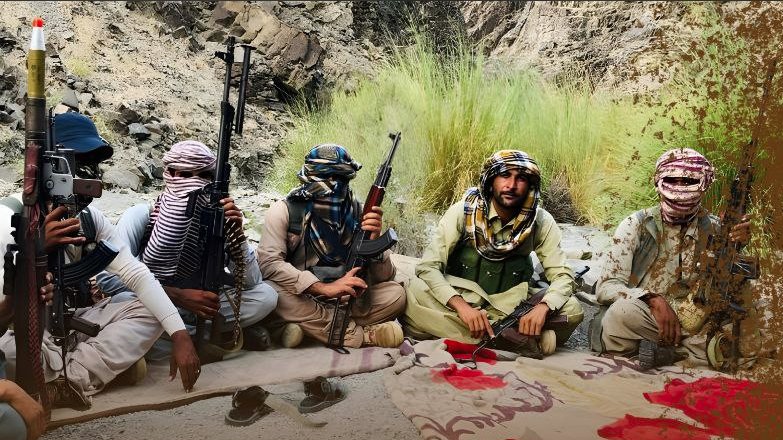In a significant development, the Baloch Nationalist Army (BNA), a Pakistani separatist group notorious for targeting Chinese interests, has recently disbanded following the surrender of its top leader, Sarfraz Bangulzai.
On December 20, Bangulzai and 70 remaining members of the militant group turned themselves to authorities in Quetta, marking a rare instance of a high-ranking separatist leader surrendering to security forces.
This event follows the arrest of Gulzar Imam, the co-leader of the Baloch Nationalist Army (BNA), in 2022, further weakening the insurgency that has posed a persistent threat in Balochistan province.
During a press conference, Bangulzai expressed a change of heart, admitting that he initially believed the armed struggle was for Baloch’s rights but later realized that Baloch’s lives were being sacrificed for personal interests.
Pakistani officials said that Bangulzai’s decision to surrender was a coordinated effort facilitated by the cooperation of Gulzar Imam, who was already in custody.
When Imam was arrested last year, it represented a notable tactical triumph for Pakistani security agencies.
This success played a pivotal role in dismantling the Baloch Nationalist Army’s (BNA) network in Balochistan, as the information gleaned from his interrogation proved instrumental in achieving this outcome.
Thus, the dissolution of the BNA is a crucial success for the Pakistani government in its ongoing struggle against escalating militant activities involving various groups, including the Pakistani Taliban and separatists in Balochistan.
The Baloch Nationalist Army (BNA) emerged on January 11, 2022, with the union of Gulzar Imam and Sarfaraz Bangalzai, a field commander associated with the United Baloch Army (UBA).

Concurrently, the BNA became a Baloch Raji Ajoi Sangar (BRAS) member, a collaborative alliance comprising diverse separatist groups.
The BNA quickly garnered attention just nine days after its inception. On January 20, 2022, the group claimed responsibility for a bomb attack in Lahore’s Anarkali area, targeting a bustling market and resulting in the loss of at least three lives, with dozens sustaining injuries.
The BNA was considered a significant player in a militant movement based in southern Balochistan, where separatists fighting to carve out their homeland have targeted Chinese nationals seen as exploiting the province’s resources and its Port of Gwadar.
The port is a pivotal cornerstone of the China-Pakistan Economic Corridor (CPEC), a US$50 billion Belt and Road Initiative (BRI) segment.
The Baloch Nationalist Army was instrumental in the Baloch Raji Ajoi Sangar (BRAS) alliance, which has taken credit for multiple attacks on Chinese interests in Balochistan and the southern port city of Karachi.
Pakistani authorities have vowed to bolster security measures for Chinese nationals within the country following a series of violent incidents. These include an ambush in August on a convoy of Chinese engineers in Gwadar, a 2018 assault at the Chinese embassy in Karachi, and a separate deadly attack in 2020 at the Pakistan Stock Exchange.
Why Did The Group Dissolve?
The disbandment of the Baloch Nationalist Army (BNA) did not come as a surprise to observers. Indications of internal discord within the BNA had surfaced earlier, evident in the group’s public statements and insights gathered from discussions with law enforcement officials and journalists in Balochistan.
In October 2022, the BNA made a public announcement regarding the escape of two of its members, Razzaq Baloch (known as Polain) and Hameed Baloch (known as Mir Jan). Allegedly, they had killed the group’s regional commander, Babar Yousaf, and kidnapped another leader, Zrumbesh.
Earlier this year, the BNA declared the suspension of a key leader, Anwar (known as Chakar), who had reportedly severed ties with the group. The BNA also issued an appeal to other separatist groups not to provide refuge to Anwar.
Furthermore, the apprehension of the top leader, Imam, not only disrupted the BNA’s operations but had a ripple effect.
The situation resulted in his former comrade being left isolated and lacking significant allies within the two largest separatist groups, namely the Baloch Liberation Army (BLA) and the Baloch Liberation Front (BLF).
Lacking the trust of the BLA and BLF leadership, Bangulzai found himself shunned by both groups. He likely then determined that forging an agreement with the government would be more advantageous than persisting in the operations of his militant organization.
Nonetheless, despite the disbandment of the Baloch Nationalist Army (BNA), experts argue that there is no assurance of a reduction in militant activities in Pakistan. Instead, they anticipate that such activities will endure and persist.
- Contact the author at ashishmichel@gmail.com
- Follow EurAsian Times on Google News